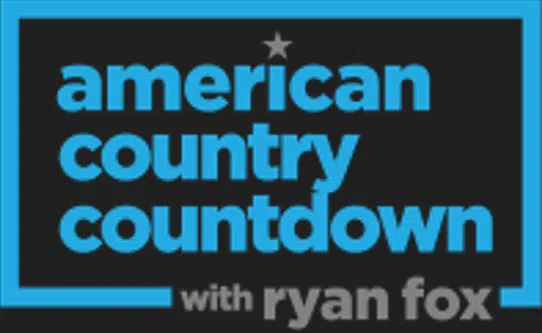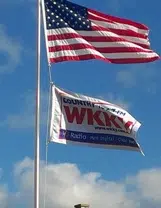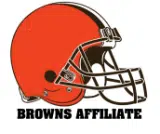After a broken foot erased his entire season, Williamson was lost, wondering if he’d ever play basketball again. But the Pelicans’ 22-year-old phenom is ready to show the world what he’s made of.
It’s 6:14 a.m. on a late-summer day, and the track at Florida Atlantic University is shrouded in darkness, save for the faint beams of light bouncing from the waistbands of three joggers, dutifully logging their steps before the world awakens. They move at a casual pace, thoroughly oblivious to the athletic marvel in their midst.
“I can clock 60,” boasts a voice in the darkness, and then he’s gone—a hulking silhouette slicing through the predawn shadows.
“They ain’t ready for you!” barks another voice. “They ain’t ready for you!”
Less than 60 seconds later, Zion Williamson is back where he started, darting across an invisible finish line, having easily beaten his goal for his last quarter-mile dash of the morning. “That’s elite!” enthuses a third voice—his stepfather and coach, Lee Anderson.
It’s an important marker for the young Pelicans star as he makes his way back from a broken right foot and a lost season. It’s a remarkable feat for anyone, period. But the South Florida sun won’t rise for another 49 minutes on this September morning, and the joggers and late-arriving soccer players have no idea what they just missed. The only real witnesses are Williamson’s personal trainer, a few family members and a reporter.
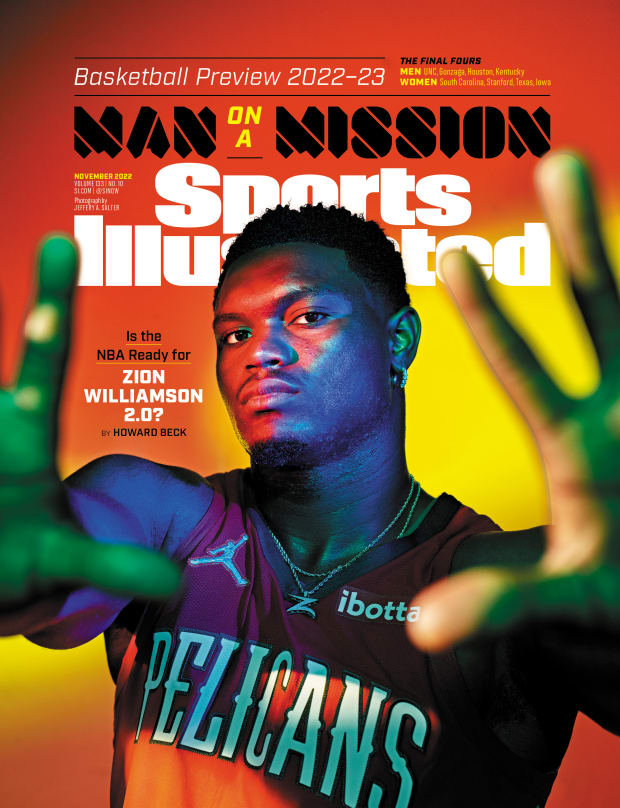
Jeffrey A. Salter/Sports Illustrated
“I personally haven’t seen a guy with his size at the NBA level with that type of speed,” says the trainer, Jasper Bibbs, as the group strolls back to the FAU gym to finish the morning workout. “There’s some guards that don’t hit those times,” adds Bibbs, who previously spent five years with the Jazz. Even more encouraging? That Williamson hit that time after he’d already run a mile and a half as a warmup.
Had there been a little daylight, here’s what everyone else on that track would have seen: a swift, sculpted 6' 6″ tower of muscle, streaking down the straightaways like a supersized Usain Bolt. This Zion Williamson is noticeably more contoured than the Zion Williamson who last appeared on an NBA court on May 4, 2021. Still brawny and stout, yes, but seemingly much closer to his college weight of 285 pounds than the estimated 300-plus he carried through the ’20–21 season.
It’s been three years since Williamson seized the NBA spotlight, a uniquely bound blend of power and grace, a can’t-miss superstar, a No. 1 pick with the charisma to match his talent. On the court, he dazzles, with the kind of devastating efficiency—25.7 points on 60% shooting—that would rank him among the all-time greats. Except, he has played just 85 games over three seasons due to injuries.
We haven’t seen Zion soar for 17 months, leaving the world to wonder: Is he still the prince that was promised? Or just a phantom passing through the twilight? What will he be when he at last takes the court again on Oct. 19, in Brooklyn?
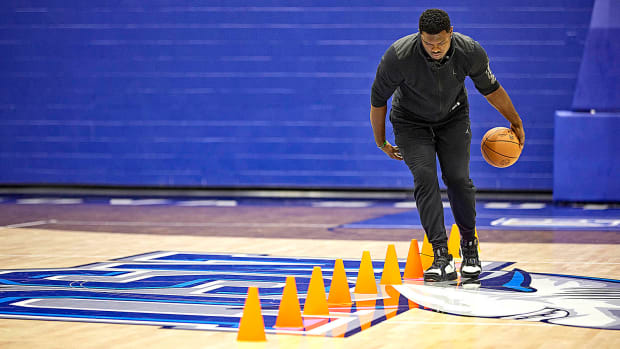
Jeffrey A. Salter/Sports Illustrated
“They’re going to see that I’ve matured off the court and on the court,” Williamson, now 22, says, following a late breakfast at a 6,000-square-foot waterfront rental in Fort Lauderdale. “And they’re also gonna see that my game has evolved. I’m gonna show the world things that I’ve had in my arsenal that I didn’t show before.”
What we’ll soon witness, he says, is a Zion transformed, mentally and physically, after the most torturous year of his life: a fractured right foot, followed by a surgery, a setback and a perpetual cascade of criticism and scorn from fans and pundits.
Zion is out of shape, they said (albeit in much harsher terms). Zion isn’t committed to the game. Zion isn’t committed to New Orleans. Zion is detached from his teammates. The physical recovery was hard enough. The negativity was suffocating.
“I was in dark places at times,” Williamson says, “because I couldn’t play basketball. I could only do limited rehab things. And then just seeing how the world reacted? It took a lot. It did a lot on my spirit.”
Outwardly, he’s in the best shape of his career, though he greets questions about weight, body fat and other metrics with just a sprawling smile. He’s pleased, yes. But Team Zion isn’t ready to disclose specifics on this day, not with another three weeks of work before reporting to training camp. “I’m not done yet,” Williamson says.
Not done, he means, with the two-a-day workouts that began here Aug. 3, nor with a disciplined new diet, as prescribed by his personal chef, Jhonas Lewis (known simply as Chef J.D.). Williamson gulps water from a two-gallon thermos throughout the day, having eschewed all other beverages.
Soon enough, Williamson will seek to reclaim his role as one of the game’s premier showmen—a high-flying, rim-wrecking nuclear reactor. Except he’s now returning to a Pelicans team that made the playoffs without him, with a new coach, an overhauled roster, a star wing in Brandon Ingram and a star playmaker in CJ McCollum. So much has changed in the 17 months that Zion was away. But then, he says, so has he.
“I’ve grown,” Williamson says. “I learned a lot about myself, learned more about the game.”
So while the rest of us might view this season as a Revenge Tour or a Remember Me campaign, Zion Williamson himself sees it more as a gauge: of just how far he’s come, of how well he’s recovered, rebuilt and evolved in the 533 days between his last game and his next one.
At his emotional nadir, as the doubts and denigration grew increasingly toxic, Williamson retreated to the Pacific Northwest—and unwittingly stoked the very fire he was trying to escape. It was January, and Williamson had decided to continue his rehab at Nike’s bucolic campus just outside Portland, in Beaverton, Ore. He would spend two months there.
He did so with the blessing of Pelicans officials—indeed, it was executive vice president David Griffin who first suggested a change of scenery—but the news only triggered more backlash, fueling public perceptions of a divide between Williamson and the franchise, Williamson and New Orleans, Williamson and his teammates.
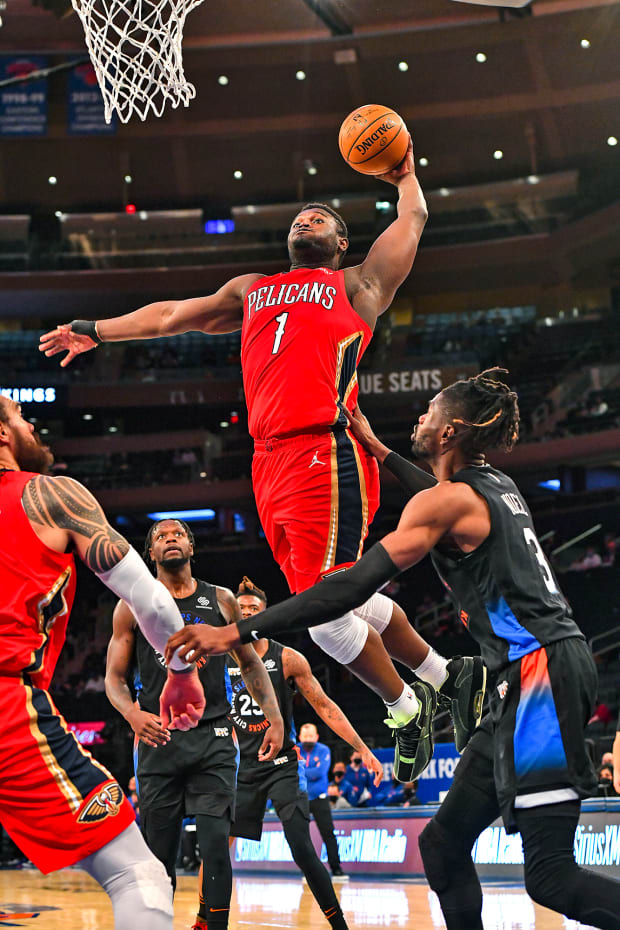
Jesse D. Garrabrant/NBAE/Getty Images
The truth was far more troubling. The setback Williamson suffered in early December—tests showed regression in the healing of his broken foot—had crushed his spirit. “I was rehabbing,” he says, “and in my mind I’m thinking, Man, in two weeks I’m about to play again. And then I didn’t.” And the criticism had turned nastier, falling on the shoulders of his mom, his stepdad and his brother, Noah, who was just 8 at the time.
“To see it affecting my family, it weighed on me,” Williamson says. “An 8-year-old having to deal with stuff like that, being asked questions that he don’t fully understand yet, that’s a lot. It bothers me that people would even do that to him.”
Williamson later adds: “I felt helpless. I couldn’t do nothing about it. While [pundits] are telling me I don’t care about my teammates, or I’m a bad teammate, or I don’t want to be somewhere, the whole time I’m worried about my foot. I’m worried about, Man, I hope my foot heals right, because if it doesn’t, who knows, I may not get to play basketball again.”
The toll grew so heavy that Williamson could hardly mask the strain. After a home game one night, as he walked out of the Smoothie King Center, he ran into Pelicans assistant coach Teresa Weatherspoon, a close friend and confidant.
“Hey, are you O.K.?” she asked.
“No,” Williamson replied, “I’m not.”
“And when he said no, he just fell into my arms,” Weatherspoon says.
A long conversation followed—part counseling session, part pep talk, unconditional support mixed with moments of tough love. And many tears shed along the way.
“At that most vulnerable moment, it was important for me to let him know that he’s a great young man and he’s worthy of those things that you work for,” says Weatherspoon, the former WNBA star and Hall of Famer. “I could see a young man fighting to find his way, had lost all sense of direction. And I just wanted to reach out at that moment and to let him know: I didn’t care about basketball; I cared about what he was feeling, what he was thinking, how difficult were things for him at that moment.”
She adds, “I didn’t want him to feel alone. And when I tell you there were some dark days for that young man, there was some dark days. . . . It was much bigger than basketball at that point. You didn’t want to lose a young man.”
It was just one of many such discussions along the way, as Williamson worked to repair both his body and his psyche, one day at a time. He leaned hard on the 56-year-old Weatherspoon (“she’s like my big sister”) and assistant coach Corey Brewer (“my people for life”), as well as his family and his faith.
Of Weatherspoon, Williamson says, “She saved me from so many kind of like mental breakdowns. When you see somebody cry for you because of what you’re going through—she cried for me. She didn’t have to do that. . . . And just seeing that made me realize, Wow, I really have somebody special in my corner.”
With the emotional support came a consistent theme: Your success, your health and your happiness are up to you. All those worries about Williamson’s fitness, his maturity, his commitment? It’s clear the Pelicans had them, too.
As Weatherspoon frequently tells him: “The things that you desire in this game, or in life period, it’s what you put into it. . . . But you have to put in. You have to make deposits. You can’t take something out if you haven’t deposited; you haven’t invested in it.”
A healthier, more serene Zion returned to New Orleans in early March, in time to cheer on the Pelicans’ late-season renaissance, sparked by the midseason trade for McCollum. The Pels won 13 of their final 25 regular-season games, ousted the Spurs and Clippers in the play-in tournament and briefly rattled the Suns in the first round before falling in six games. The Smoothie King Center—moribund or empty for much of Williamson’s career due to the coronavirus pandemic—was rocking.
“That was special,” Williamson says, lighting up at the recollection. “I remember sitting on the bench. Even though I was sitting still, I felt like my blood was racing, like I was playing out there. I haven’t felt that thrill, a crowd being like that, since my rookie year. And man, it was something. It was something to witness.”
Then he laughed, recalling all the rumors about his wanderlust. “People really out here think that I could witness something like that and then tell myself I don’t want to be [there]?”
McCollum’s arrival in February—via a trade with Portland that also included Larry Nance Jr. and cost the Pelicans only role players and draft picks—had spurred another minor controversy, when former Pelicans guard and ESPN analyst JJ Redick revealed Williamson had not reached out to his new teammate. “Detached,” Redick called him, echoing concerns that had been filtering through the organization for some time. But McCollum and Williamson would later connect, sharing several dinners and some extended conversations about work habits, nutrition, hydration, sleep, “just being a professional,” McCollum says. “I think he appreciated my candor.”
In their brief time as teammates, McCollum says he’s seen a Zion who is “very active, very engaged, very involved, very cognizant of what’s going on.”
“But he also understands that the onus is on him now,” McCollum says, “to do things the right way, to continue to eat the right way, to do the work the right way. . . . I think he’s at that stage now where he’s taking responsibility for his actions.” All of which echoes what Weatherspoon herself conveyed to Williamson: “The change has to come, and the change has to come from him. And he knew that.”
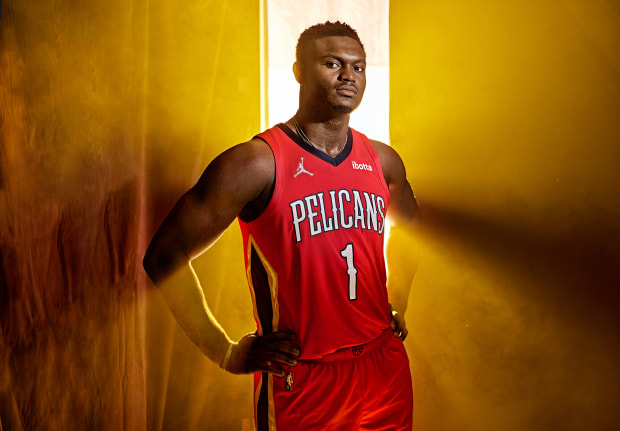
Jeffery A. Salter/Sports Illustrated
There are basic basketball challenges to sort out now with Williamson joining McCollum and Ingram—about roles and playmaking and pecking orders, about touches and usage rate—but chemistry comes only through time, and the Pelicans seem confident about the road ahead and their potential to make noise in the West. Williamson says he’s thrilled to have two elite scorers to share the load and more shooters on the roster than he’s had since arriving in New Orleans.
“The best version that he can give us,” McCollum says of Williamson, “will be the best version of our team.”
What’s up with Zion?!” a young girl asks, a touch of concern in her voice, as if speaking for millions of fans who are wondering where he’s been, how he’s doing and what he’ll look like when he reemerges.
“He’s training underwater!” a young boy responds excitedly. “Yeah, he’s coming for everybody next year.”
Well, not exactly, but you can’t blame the Jordan Brand marketing team for having fun with the mystery of it all in a recent series of ads for the Zion 2 shoe. Williamson has rarely been seen or heard in the last 17 months, outside of a July 6 press conference to announce a contract extension worth at least $193 million (a deal that, sources confirm, includes weight and body-fat requirements).
The what/where/when/how of Williamson’s recovery are topics he prefers to keep private, which also partially explains his two-month stays in Portland and Fort Lauderdale. “I don’t like people to know my next move,” he says. Nor does he want to reveal anything about his training, his diet, his weight, his sprint times or the skills he’s been quietly honing all these months off the radar.
“I’m one of those people that I like to show you more than I tell you,” Williamson says. “Because I feel like when I tell, it doesn’t even feel humble at all. So,”—and here he claps for emphasis—“I have to show the world.”
And though he won’t divulge his weight, Williamson jokes that he wouldn’t mind that number leaking—as a counterpoint to the whispers of him once weighing 330 pounds. “When I step on the scale when we start training camp, I wonder if there’s gonna be any rumors about that!” he says, laughing.
The more Williamson reflects, the more amped he sounds, and soon he is naming everyone who made this journey with him, as if he were onstage at the Oscars. He thanks Anderson and Bibbs for their training, and Chef J.D. for his diet (“the main keys to why I look the way I look now, why I feel as great as I do”); thanks his friends Axel Nyembwe, Phil Holmes and Kailik Faulk for supporting him through his workouts (and sometimes participating in them). “Everybody’s played some kind of part,” he says. “But what this journey was about that I’m on currently, down in Fort Lauderdale, this was to test my love for the game.”

There is nothing about Zion that seems detached or disengaged on this day. He smiles often, laughs frequently and speaks candidly, alternating between moments of somber reflection and bursts of unbridled enthusiasm, always finishing on a positive note: “It was a long, tedious process,” he’ll say, before quickly adding, “but it’s nothing but excitement and just pure joy and love for the game I get to return to.”
It calls to mind a quote from Stan Williams, the Pelicans’ strength coach, who often told Williamson during his recovery, “Look, it only makes the story better.” It first struck Williamson as “corny,” but he came to embrace it. “I really feel that,” he says. “Like, if I can really come back from this right . . . this could be something crazy.”
It’s 5:20 a.m. on that early-September morning when two black SUVs pull up to the back door of the FAU Arena, delivering Williamson, Bibbs and Anderson, along with Zion’s mom, Sharonda Sampson, Noah, and a small group of friends and assistants, including on this day his barber (for a Sports Illustrated photo shoot).
This has been Williamson’s routine every day since Team Zion decamped to Fort Lauderdale: rising at 4:50 a.m., arriving at FAU a half hour later for a morning conditioning session with Bibbs, followed by basketball drills with Anderson. The timing is deliberate, designed to get them out by 7:45, before the women’s volleyball team takes over the gym—and to hopefully avoid detection by curious onlookers.
The morning workout is often followed by a 30-minute spin session at Hotworx, a combo fitness center/sauna, with the room’s thermostat cranked to 130 degrees, to burn extra calories. Then comes a breakfast from Chef J.D., an afternoon nap, an early dinner and, finally, another round of training and drills in the evening, at Nova Southeastern. Williamson’s day concludes after 9 p.m., the skies dark again.
The time for spotlights and highlights and “Yo, remember me?” jackhammer dunks will be here soon enough, a time to show instead of tell. But Zion 2.0 says none of that really matters to him, at least not in the way we expect.
“If you would have asked me two years ago, I definitely would have said, ‘Yeah, I need to remind people. I need to show the world who Zion is,’ ” he says. “But now, after this journey, it’s not even so much about showing the world who I am. It’s more so just proving myself right.”
Six years ago, a 16-year-old Zion Williamson tweeted a six-word vow—“I’m going to shock the world”—a sentiment that suddenly seems apt for 22-year-old Zion Williamson, in a way he never could have envisioned. The path has been more twisted, more painful, than he ever could have known. But then, it just makes the story better.
More NBA Coverage:





